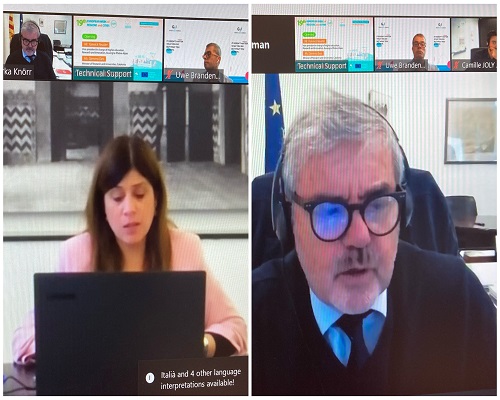- The conference is part of the events of the Catalan presidency of the Four Motors for Europe, the interregional cooperation partnership with Baden-Württemberg, Lombardy and Auvergne-Rhône Alpes

The Catalan Minister of Research and Universities, Gemma Geis, and the representative of the Government of Catalonia to the European Union, Gorka Knörr, participated virtually in the opening of the conference 'The main regional challenges of European higher education', which is part of the initiatives promoted during the Catalan presidency of the Four Motors for Europe. The conference is part of the side events of the European Week of Regions and Cities, the annual forum where regions coordinate policies to boost Europe's competitiveness, this year under the slogan 'Together for Recovery'.
The conference aims to strengthen interregional cooperation and exchange experiences in order to face the challenges that the European higher education and research face. Internationalization, the implementation of the Sustainable Development Goals (SDGs) and talent development are the starting point to discuss how universities contribute to a more prepared, resilient and empowered society, which can add value to the transformation in facing social challenges of the post-COVID era.
The minister highlighted the potential of all the regions in the four-engine network and referred to Catalonia as a country active in knowledge, recalling that the department she heads "prioritises making knowledge one of the key elements of the country, a fundamental pillar of our society". Along these lines, he affirmed that "Catalonia, the regions that work together in this network, the whole of Europe and all the territories on a global level, are emerging from this crisis convinced that knowledge gives us the tools and shows us the way to respond to the challenges".
Geis also presented data from a report drawn up by the Agency for the Management of University and Research Grants (AGAUR) on Catalonia's collaboration with the other three regions of the 4 Motors and Wales, in relation to the attraction of European funds, "which shows that we are a highly competitive network, as we have attracted 7.6% of the total Horizon 2020 funds and have participated in 20.8% of the projects financed", he explained.
For his part, the delegate of the Government of Catalonia to the European Union, Gorka Knörr, pointed out that the aim of the session was to "strengthen our cooperation and seek solutions in this new post-pandemic scenario in order to contribute to the European debate in the most cross-cutting way possible".
The conference, organized by the Department of Research and Universities and the Delegation of the Government of Catalonia to the EU through the working group which has the same name as the European association, is part of the 19th European Week of regions and cities 2021. The program has been structured as an online discussion consisting of two main lectures and three parallel sessions. The lectures were given by the expert in internationalization of higher education, Uwe Brandenburg, and the director of Innovation, Research and Innovation of the European Research Area at the European Commission, Anna Panagopoulou, who spoke about the European Universities Initiative. The sessions addressed challenges such as internationalization, as well as the key role of universities in promoting the 2030 Agenda and the SDGs, and in contributing to competitiveness through the development of skills and competencies of the population. A central role on which the different speakers - university vice presidents and regional experts from the Four Motors for Europe and the associated territory of Wales - have debated from a regional perspective, and shared ideas on strategies to address them.
Four Motors for Europe (4ME)
Founded in 1988, it is an interregional cooperation association between the territories of Catalonia, Baden-Württemberg, Lombardy, and Rhône-Alpes (now Auvergne-Rhône-Alpes), with the aim of increasing the economic, scientific, social and cultural potential of these territories, which are leaders in these fields, internationalizing the four regions and their companies, and participating actively in the construction of Europe, mainly through joint positioning. Occasionally, regions join as partners in order to participate in certain initiatives, particularly economic cooperation. This is the case of Flanders, Wales and Quebec. In most activities, however, only the four signatory territories are involved.
4ME cooperation is based on the principle of institutional flexibility and does not have its own governing bodies or budget. The rotating presidency lasts approximately one year and culminates in a meeting of presidents, as part of the handover of the presidency.
Catalonia assumed the presidency of the Four Motors for Europe from Lombardy in an institutional act in Milan on 25 September 2020. The Catalan Presidency's programme focuses on the 17 SDGs of the 2030 Agenda, as well as on the European Green Deal, in order to strengthen the transformative resilience of our societies. Inspired by the 3 dimensions of the 2030 Agenda, the program is organized in three dimensions: economic, social and environmental resilience.